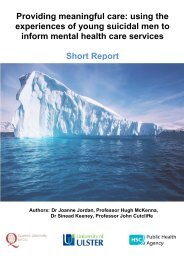Saving Mothers' Lives: - Public Health Agency for Northern Ireland
Saving Mothers' Lives: - Public Health Agency for Northern Ireland
Saving Mothers' Lives: - Public Health Agency for Northern Ireland
You also want an ePaper? Increase the reach of your titles
YUMPU automatically turns print PDFs into web optimized ePapers that Google loves.
Commentary on deaths related to drug and alcohol misuse<br />
Judy Myles<br />
Introduction<br />
Fifty-seven women out of the 98 women whose deaths are discussed in this Chapter had problems with<br />
substance abuse. Forty fi ve were misusing drugs and twelve were alcohol dependent. A further six cases<br />
of substance abuse were identifi ed this triennium but have not been assessed in this Chapter. Although<br />
the majority of those who were drug dependent were using heroin, most were also using methadone,<br />
amphetamines, cocaine, benzodiazepines and some alcohol as well.<br />
A small number died from suicide, the rest died from an “accidental” but lethal overdose of their drug of<br />
abuse, the physical consequences of their abuse or from related medical conditions. Some died from<br />
domestic abuse.<br />
Many of these women were socially excluded and most were homeless or living in very poor circumstances.<br />
The majority were late bookers and poor attenders <strong>for</strong> antenatal care. Most had previous children in the care<br />
of the local authority and were subject to child protection conferences in their current pregnancy.<br />
Substance misuse there<strong>for</strong>e makes a signifi cant contribution to maternal mortality in general and to<br />
psychiatric causes of maternal death in particular. As shown in Chapter 1, 11% of all the women who<br />
died this triennium, of any cause, had problems with drugs or alcohol. Sixty per cent were registered drug<br />
addicts The care of these women during pregnancy and the postnatal period presents a challenge to<br />
maternity, drug treatment and social services.<br />
Service delivery<br />
Although pregnant women are fast tracked into treatment in the majority of drug and alcohol services in<br />
the UK, there is still a signifi cant disparity in the numbers of women, in comparison to men, recruited into<br />
treatment services. The rate remains at a ratio of three males to one female, despite ef<strong>for</strong>ts to increase the<br />
number of women attending14 . This is particularly of concern as the numbers of women misusing drugs and<br />
alcohol are rising. Women over the age of 16 have markedly increased their levels of harmful and hazardous<br />
alcohol consumption in comparison to men. Amongst women between the ages of 16 and 24, 24% have used<br />
an illicit drug in the previous year. Both drug and alcohol use in women of fertile age is becoming normative<br />
behaviour with a consequent increase in the numbers of exposed pregnancies and the refl ected increase in<br />
maternal mortality either directly or indirectly associated with drug or alcohol misuse.<br />
It is of utmost priority, there<strong>for</strong>e, that substance misuse services should provide environments that are<br />
acceptable to women of reproductive age, both <strong>for</strong> access and <strong>for</strong> retention in treatment. This is particularly<br />
an issue <strong>for</strong> women from ethnic minorities where drug or alcohol use is deemed unacceptable and<br />
consequently service access is particularly problematic:<br />
A mother of Asian origin died in early pregnancy from hepatic failure. She had been abusing<br />
alcohol <strong>for</strong> several years and had a long history of related gastrointestinal problems. She had not<br />
taken up the offer of help from her GP and the local alcohol services. Her GP did not convey this<br />
in<strong>for</strong>mation to the maternity services and her family actively concealed her alcohol problem from<br />
those caring <strong>for</strong> her.<br />
This case also illustrates the particular diffi culties that women from an ethnic minority group may have in<br />
accessing substance misuse services and the importance of GPs in<strong>for</strong>ming maternity services about a<br />
previous psychiatric of substance misuse history.<br />
165



